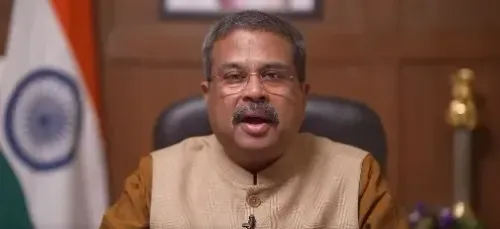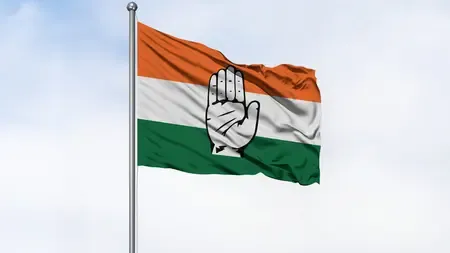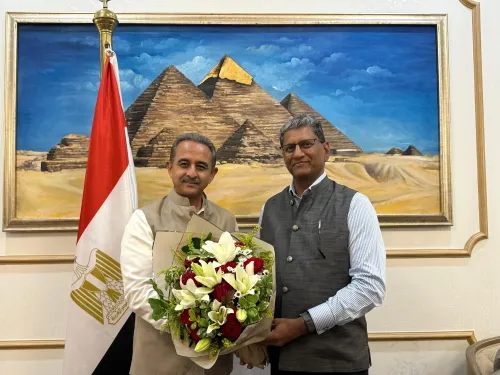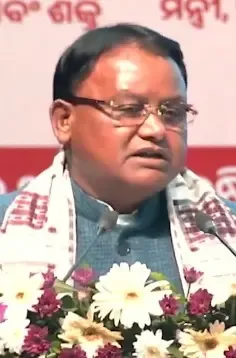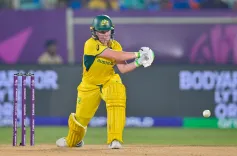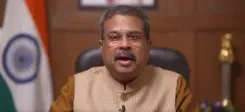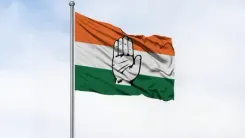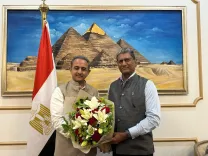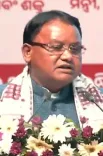Did Afghan FM Assert Control During Press Meet with Female Journalists?
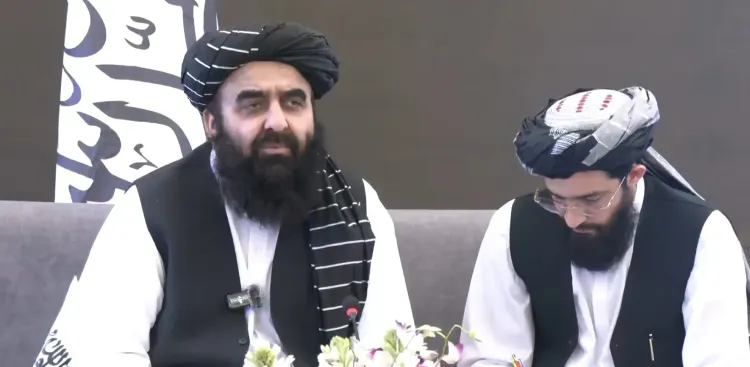
Synopsis
Key Takeaways
- Afghan FM asserts control over the embassy in New Delhi.
- Female journalists included in press meet, signaling a shift.
- Discussions on trade and healthcare took place with Indian officials.
- Plans for new air routes connecting India and Afghanistan announced.
- Emphasis on education rights for women in Afghanistan.
New Delhi, Oct 12 (NationPress) Visiting Afghan Foreign Minister Amir Khan Muttaqi on Sunday firmly declared control over the Embassy situated in New Delhi, showcasing the Islamic Emirate's flag both in front and behind him.
"This is our flag. We fought jihad under this. This is 100 percent our embassy. All those who are working here... they are all with us," Muttaqi responded to a query from IANS, as he pointed to the Islamic Emirate’s flag waving behind him and at the front of his table while the embassy officially still displays the former flag, representing the regime of Ashraf Ghani.
However, India has yet to formally recognize the Taliban regime.
In contrast to the controversial press conference held on Friday, which barred female journalists and allowed only a small number of media personnel, Sunday’s briefing at the Afghan Embassy on Shantipath was filled with reporters, including several women journalists and international correspondents.
This change is seen as a corrective measure, addressing strong criticism from both Indian and foreign media regarding gender-based restrictions.
During his week-long visit to New Delhi, Muttaqi indicated that his delegation has had "constructive and result-oriented" discussions with External Affairs Minister S. Jaishankar.
"We talked about trade, economy, healthcare, aviation links, and development projects. India has committed to facilitating trade visas, student exchanges, and resuming stalled infrastructure projects," he shared.
Jaishankar also informed him of India's intention to enhance the embassy in Kabul.
The Afghan FM announced new air connectivity plans, including routes from Delhi to Kabul, Mumbai to Kandahar, and Amritsar to Afghanistan.
A joint trade committee between India and Afghanistan will also be established, and discussions included proposals for mineral cooperation, agricultural projects, and sports diplomacy.
Muttaqi confirmed that Afghanistan has urged India to consider reopening the Attari-Wagah border for Afghan goods.
In response to concerns regarding women’s rights, the Foreign Minister stated: "Everyone's rights are protected in Islam, whether man or woman. We do not oppose education. Education is not haram."
He claimed that more than 10 million students, including girls, are currently attending school in Afghanistan, with restrictions only in "specific areas".
The Afghan FM disclosed that he addressed the situation of Afghan detainees in India and sought arrangements for their return.
He also revealed that his delegation visited Deoband, engaged with students, and discussed academic exchanges between Darul Uloom Deoband and Afghan institutions. “Our ulema have historical ties with India. We will enhance academic and cultural exchanges,” he asserted.
On the topic of Pakistan, Muttaqi was direct. “We desire zero tension and peaceful relations. However, if ties are mishandled, we are capable of managing security,” he cautioned, adding that Pakistan should "regulate its own checkpoints" instead of blaming Afghanistan.
He dismissed the existence of Tehrik-e-Taliban Pakistan (TTP) on Afghan territory.
"For 40 years, we have battled the Soviets, Americans, and NATO. Now we are independent and standing on our feet,” he expressed, reaffirming that Afghanistan would pursue autonomous relations with India based on "mutual respect and trade cooperation".
Meanwhile, Afghan embassy staff, speaking under anonymity, expressed their apprehension regarding the display of the Islamic Emirate flag, noting that the Indian side has yet to grant recognition to the regime in Kabul.

